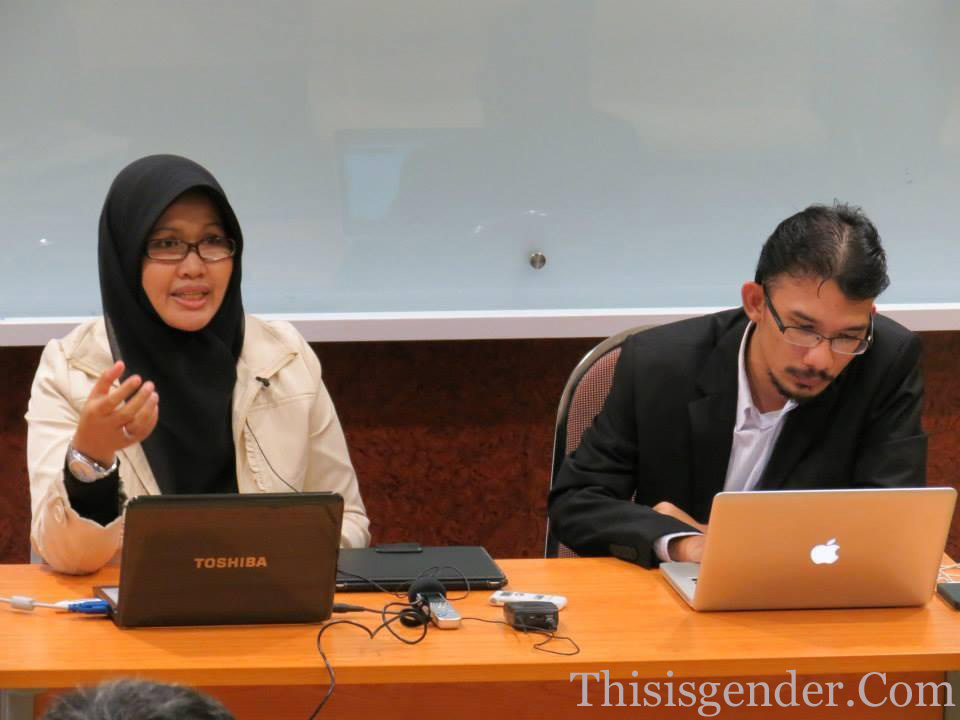
The University of Technology Malaysia (UTM)’s Center for Advanced Studies in Islam, Science and Civilisation (CASIS) is proud to have hosted Dr Dinar Dewi Kania from Institute for the Study of Islamic Thought and Civilizations (INSISTS) on Tuesday, 28 August 2013 at Menara Razak UTM, Kuala Lumpur. She offered her perspective on feminist discourse and its extremities that is currently getting inroads in Indonesia. The event was moderated by CASIS’ own noted activist in gender and homosexuality debates, Muhammad Husni b. Mohd. Amin.
Feminism is widely-debated in Muslim societies , where the movement tend to receive lukewarm responses. Muslim societies are in disagreement about the impact of feminism on society, judging from the silence coming from Islamically -oriented groups and individuals . There exists a spectrum of issues that the feminist discourse promotes, ranging from the question of justice for women all the way to lesbian gay, bisexual and transgender (LGBT) rights. Dr. Dinar Kania began by showcasing several statements made by feminists who propagate a man-hating agenda. She pointed out that many such agendas stemmed from a cultural worldview that originates from Christian doctrines. She quoted verses from the Bible that support the feminists’ claims against religion.
Western feminists attempt to transform Christianity’s perspective on women by employing a female hermeneutics. Dr. Dinar Kania quoted Susan Osborne who wrote in Feminism:Pocket Essetials, “Feminism is a way of looking at the world, which women occupy from the perspective of women. “ She highlighted how this female perspective is represented through three-waves of thought in feminist study, with the culmination in thought that focuses exclusively on the impact of religion on feminism.
Dr. Dinar Kania provided a brief overview of the transformation activities that have occurred and are actively propagated in her country, Indonesia. The agenda of transformation by the feminist and LGBT movements in Indonesia is generated at all levels of public schooling, namely the tertiary, primary and secondary level. At the tertiary level, there are numerous projects being launched such as the publication of journals and textbooks, the establishment of centers for Women Studies to stimulate further research, and there are also funds allocated for scholarships and endowments in this area. At the secondary level, students are targeted for LGBT socialization process through comic books that portray the alternative lifestyle to be normal and necessary for self-realization. Dr. Dinar Kania introduced several personalities who are at the forefront of feminist socialization such Siti Musdah Mulia, Ester Mariani Ga, Abdul Munir Mulkan and also various organizations that promote Lesbians, Gays, Bisexuals and Transexuals (LGBT) lifestyle such as Gaya Nusantara, Ardhanary Institute and Tomboy Pontianak.
Their core agenda appears to be the reformation of the Islamic religion as evident from their targeting the Islamic studies curriculum, which they claim to carry various biases towards women.
INSISTS has been instrumental in highlighting the abuses of religious principles that has been implemented in the name of feminist and LGBT’s civil rights. In order to clarify the myriad confusions and discourage further erroneous practices amongst the Muslims, the institute has established this special center as part of INSISTS network in Indonesia. The Center for Gender Studies (CGS) to deal specifically with the problems posed by extreme forms of feminism on April 7, 2012. This includes the launch of a website called www.thisisgender.com. This site functions as a one-stop center for knowledge about Islam’s view of contemporary issues affecting women, their families and society at large.
Dr. Dinar Kania reiterated the need to offer multi-faceted solutions to this societal threat, such as through the publications of articles, novels and journals that help society learns how to overcome this challenge. She mentioned networking to be an important focus, whereby Muslim activists and academics can join efforts with sociologists in order to maximize their impact on society. Training should be offered at various areas including university campuses and schools. Other efforts to maximize training potential would be the training of trainers, the publications of training modules and the establishment of consultations bureaus where knowledgeable Muslim activists can work on a personal basis with at-risk individuals. A networking example she quoted was the collaboration between scholars of Islam (ulama) in religious schools (pesantren) with psychological experts in order to provide Islamic counseling and therapy for Muslims that were previously involved with the vice of LGBT.
Dr. Dinar Kania’s impact on the audience is apparent from the number of questions she received. She addressed several questions in regard to the proper definition of feminism and its compatibility to the Islamic way of life. She addressed the problem regarding the tepidity of Muslim women who understand the worldview of Islam, in debating with extreme feminist groups. She admitted that she initially felt hesitant as well. However, the acuteness of the threat to Muslim societies encouraged her to dive into her current role as the director of the Center for Gender Studies (CGS). She urged Malaysian academics and activists, especially amongst the female population to contribute their part to the polemic of gender issues in the region.
Rep : Khalina Khalili – PhD candidate in CASIS.



